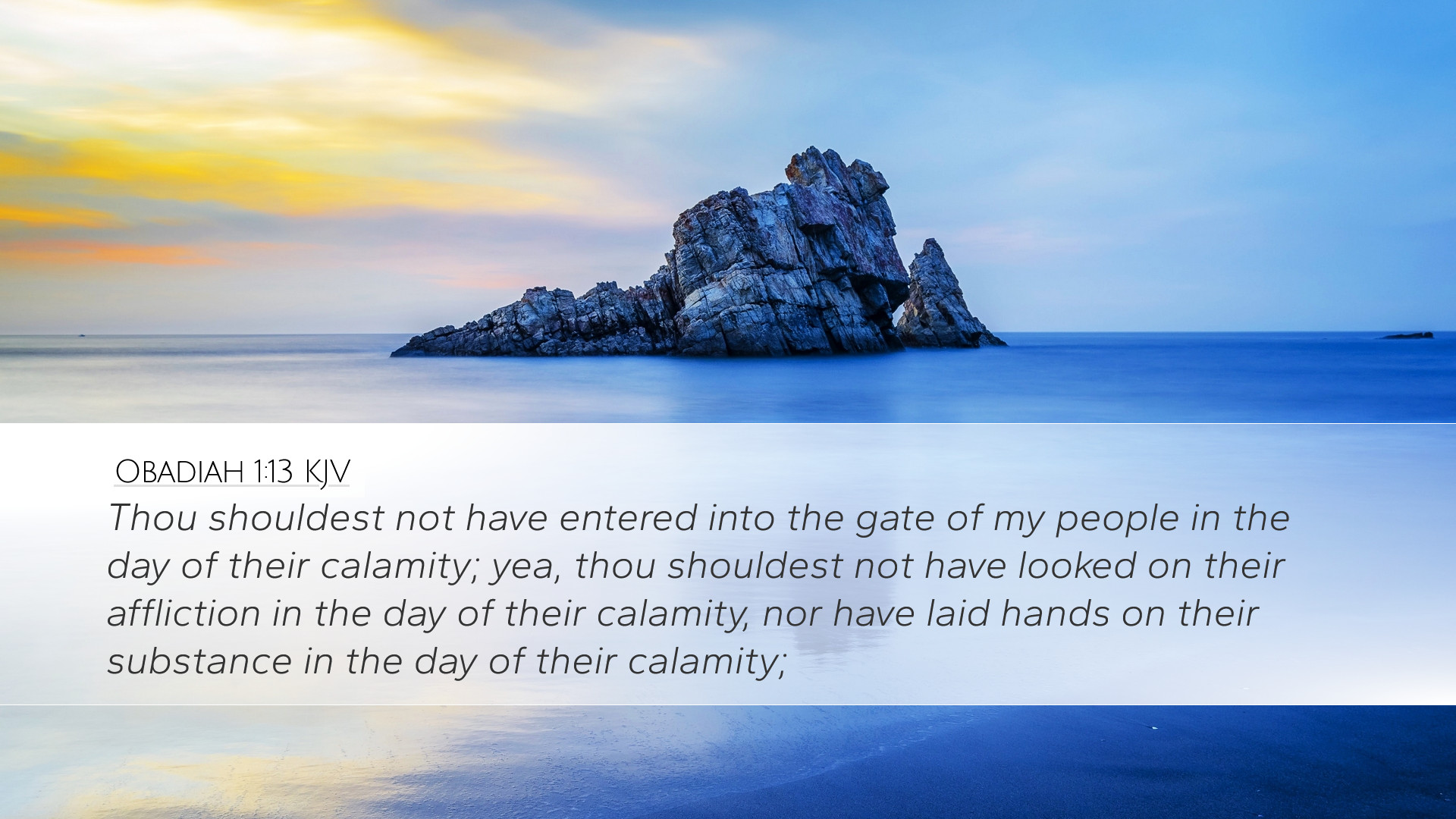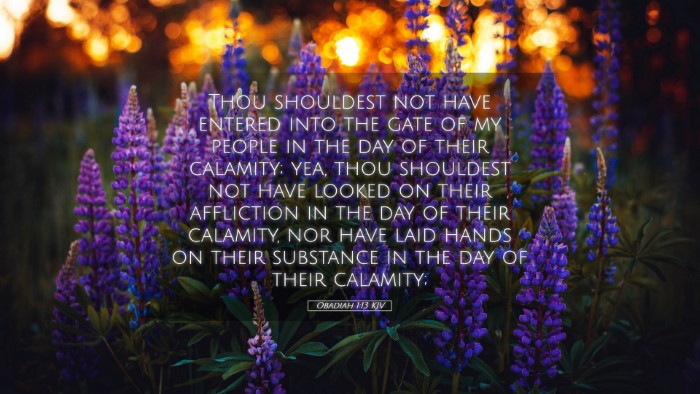Commentary on Obadiah 1:13
Verse Text: "But you should not have gazed on the day of your brother in the day of his captivity; nor should you have rejoiced over the children of Judah in the day of their destruction; nor should you have spoken proudly in the day of distress."
Introduction
The book of Obadiah is the shortest in the Old Testament, yet it carries a profound message concerning judgment, pride, and the consequences of betrayal among brothers. This commentary focuses on Obadiah 1:13, which addresses the Edomites' improper attitude toward their brothers, the Israelites. In this analysis, insights from public domain commentaries by Matthew Henry, Albert Barnes, and Adam Clarke will be synthesized to provide a comprehensive understanding suitable for pastors, students, theologians, and Bible scholars.
Contextual Background
Obadiah addresses the nation of Edom, descendants of Esau, who through pride and violence turned against their brothers, the children of Israel, descendants of Jacob. This familial betrayal heightens the gravity of their offense because it reflects a deeper spiritual and moral failing. The specific events referenced in Obadiah relate to the Babylonian conquest of Jerusalem, highlighting how Edom not only stood by but also celebrated Israel's suffering.
Verse Analysis
Gazing and Rejoicing
Henry notes that the act of "gazing" signifies a passive yet critical observation that leads to delight in the misfortune of others. It is an attitude marked by indifference turned into mockery. The Hebrew word used indicates not just awareness but a deliberate focus on the suffering of Israel. Edom’s spectatorship evolves into rejoicing, representing an emotional engagement that demonstrates deep-seated malice.
- Spiritual Implications: This behavior underscores a moral failure to live in brotherly love and compassion.
- Familial Responsibility: As relatives, the duty of Edom was to support, not to scorn.
Pride and Distress
Barnes emphasizes how speaking “proudly in the day of distress” reflects arrogance, particularly as the Edomites took glee in Israel's ruin. Here, Obadiah exposes the deep-rooted sin of pride that blinds a nation to its moral obligations. Such pride results in a sense of superiority that often leads to a callous heart, unable to empathize with the pain of others.
- Pride's Deception: Pride distorts reality, making individuals believe themselves above those they should support.
- Consequences of Arrogance: As the Edomites celebrate, they set themselves up for their own judgment.
Prophetic Warnings
Clarke points out that this verse serves as a prophetic warning not only for Edom but for all nations that seek to take advantage of the misfortunes of others. The message is clear: God is aware of these actions, and divine justice will ultimately fulfill His promises to exact recompense. This connects to the broader theme found throughout Scripture where God’s people are cautioned against pride and vindictiveness.
Theological Perspectives
God's Justice
The juxtaposition of Judah's suffering and Edom’s unbridled joy raises complex questions about divine justice. Theologically, God's judgment extends beyond mere observation of humanity's actions to a profound understanding of the hearts involved. Henry remarks that God's retribution is not merely for the visible actions but also for the underlying intent manifest in one's heart.
Community and Consequences
This passage invites reflection on the interconnectedness of communities. Edom’s transgressions against Judah serve as a reminder that the behavior of one community can impact another significantly. This implies that God holds nations accountable for their relation to His people, which can serve as a sobering reminder for contemporary understanding of national identity and responsibility.
Practical Applications
For Pastors:
- Encourage congregations to cultivate empathy and active support for those facing injustice.
- Preach on the dangers of pride and the importance of humility in relationships, especially within the faith community.
For Students:
- Analyze the historical context of the Edomites and their failure to act righteously as a case study in moral responsibility.
- Discuss how pride can manifest in modern society and the implications of apathy towards others' suffering.
For Theologians and Scholars:
- Examine the implications of divine justice as portrayed in Obadiah in relation to other prophetic texts.
- Compare the themes of betrayal and pride in Edom’s story with other biblical narratives to draw parallels in human nature.
Conclusion
Obadiah 1:13 serves as a powerful reminder of the moral and spiritual obligations that arise from being part of a community, especially one bound by familial ties. The folly of Edom lays bare the dangers of pride and the consequences of failing to act justly towards those who suffer. As we reflect on this verse, may we strive towards a commitment to compassion, support, and a just society that honors both unity and righteousness.


